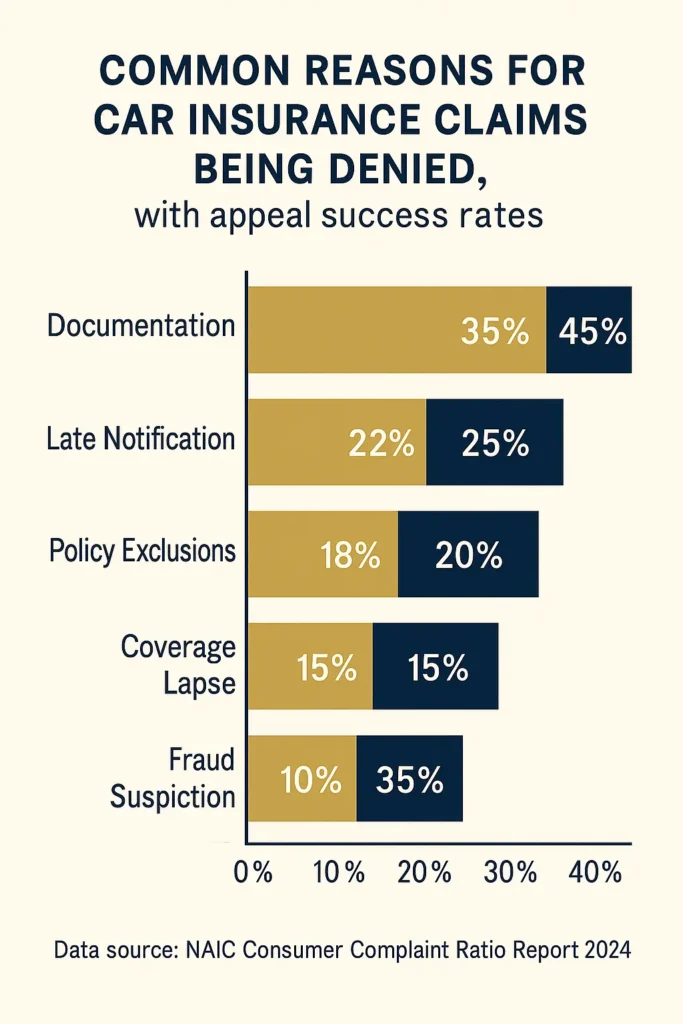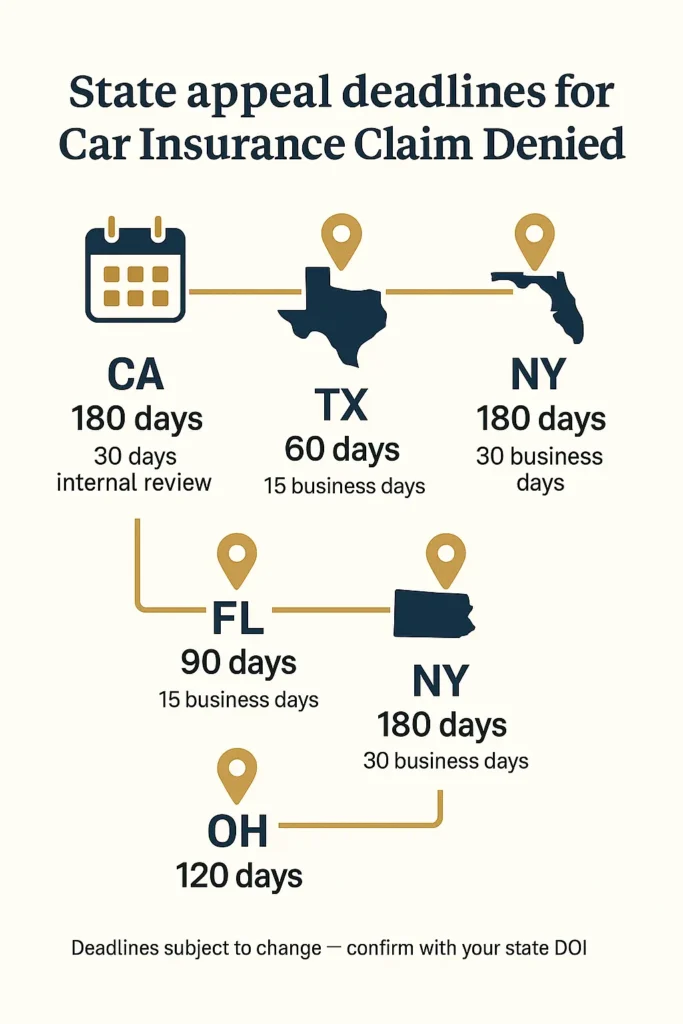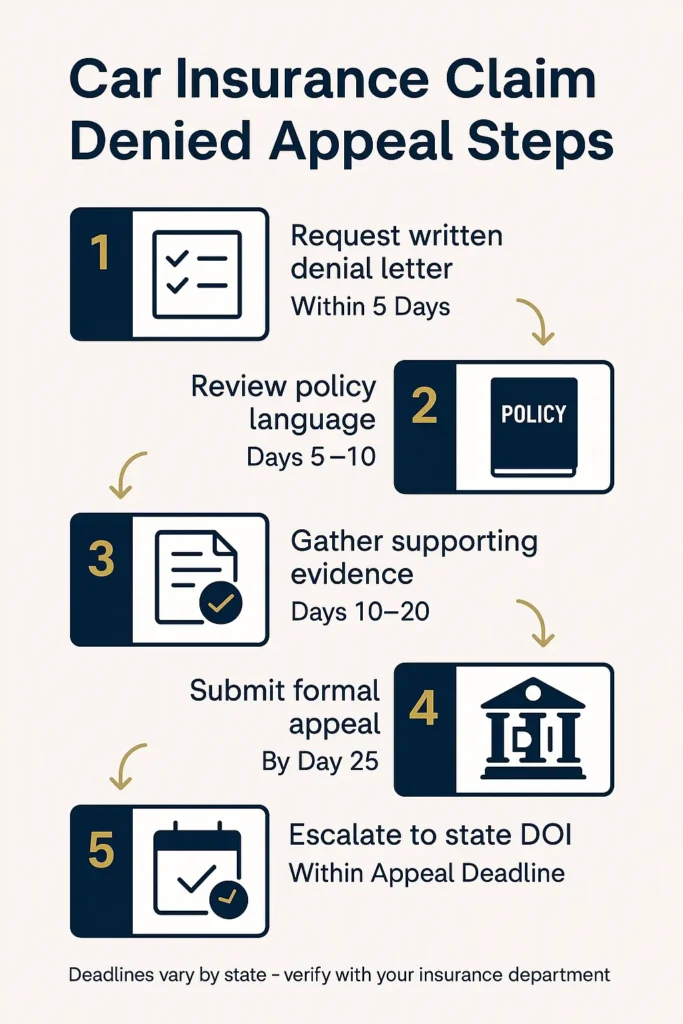Having a car insurance claim denied creates immediate financial stress and confusion about next steps. Recent data from NAIC’s Consumer Complaint Ratio Report shows auto insurers denied approximately 8-12% of collision and comprehensive claims in 2024, affecting hundreds of thousands of American drivers. When your vehicle damage claim gets rejected, understanding why it happened and how to appeal becomes critical to recovering losses and protecting your financial interests.
We analyzed 2024 regulatory data from state insurance departments and federal agencies to explain denial reasons, appeal procedures, and policyholder rights. You’ll discover the most common causes of rejections, understand state-specific appeal deadlines, and get actionable steps to challenge unfair denials through proper documentation and regulatory channels.
Quick Answer: A car insurance claim denied means your insurer has refused to pay for damages or losses you submitted, typically due to policy exclusions, documentation issues, late reporting, or coverage disputes. You have 30-180 days to appeal depending on your state, and must submit a formal written request with supporting evidence to trigger an internal review.
Knowing how to navigate a car insurance claim denied situation successfully can mean the difference between absorbing thousands in repair costs or having your claim reconsidered and approved through proper appeal processes.
On This Page
What You Need to Know
- Denial rates for auto claims range from 8-12% nationally, with significant state variations based on regulatory oversight
- Most states require insurers to provide specific written reasons for denials within 15-30 days of their decision
- Appeal success rates reach 30-40% when policyholders submit complete documentation and cite specific policy language
Understanding Car Insurance Claim Denied Situations
When insurers reject vehicle damage claims, they must follow specific regulatory requirements established by state insurance departments. The denial process involves formal notification procedures that protect consumer rights while allowing companies to manage risk according to policy terms. Learning how a car insurance claim denied decision gets made helps policyholders identify potential errors and build stronger appeals.
Insurance companies denied roughly 2.8 million auto claims in 2024 according to Insurance Information Institute analysis, representing significant financial impact on American households. State regulators require written denial letters that specify exact policy provisions or factual reasons supporting the rejection decision.
Common Reasons Claims Get Rejected

Coverage disputes arise when policyholders and insurers disagree about whether specific damages fall within policy terms. Documentation gaps, late reporting, and policy exclusions account for the majority of denials nationwide.
Michael, 42, Tampa Filed comprehensive claim for storm damage totaling $8,200. Insurer denied citing “gradual deterioration” exclusion after inspecting vehicle. He appealed with meteorological data proving sudden storm event, claim approved for $7,800. Lesson: Challenge vague denial reasons with specific evidence contradicting insurer’s position.
The regulatory framework governing claim denials varies significantly across jurisdictions, with some states imposing stricter notification timelines and appeal procedures than others. California’s Department of Insurance requires insurers to acknowledge claims within 15 days and make coverage decisions within 40 days, while other states allow longer processing periods. Understanding your car insurance coverage becomes essential when facing rejection decisions.
Why Car Insurance Claims Get Denied
Auto insurance claim rejections typically fall into five distinct categories that account for the majority of coverage disputes nationwide.
Documentation deficiencies represent the leading cause of claim denials, affecting approximately 35% of rejected claims based on NAIC complaint data from March 2024. Insufficient police reports, missing photographs, or incomplete repair estimates give insurers grounds to refuse payment until policyholders provide required evidence.
| Denial Reason | Percentage of Total | Appeal Success Rate |
|---|---|---|
| Insufficient documentation | 35% | 45% |
| Late notification | 22% | 25% |
| Policy exclusions | 18% | 20% |
| Coverage lapses | 15% | 15% |
| Fraud suspicion | 10% | 35% |
Policy exclusions cause roughly 18% of claim rejections, particularly for mechanical breakdowns misrepresented as collision damage or wear-and-tear issues claimed as sudden losses. State insurance departments consistently uphold these denials when policy language clearly excludes the damage type.
Sarah, 29, Denver Submitted $4,500 claim for engine failure after accident. Insurer’s investigation revealed pre-existing mechanical issues unrelated to collision. Claim denied, she paid full repair cost. Lesson: Understand coverage limits before filing claims mixing accident damage with unrelated mechanical problems. Most car insurance claim denied outcomes for mechanical issues stem from misunderstanding what collision coverage actually protects.
Late notification violations trigger approximately 22% of denials according to industry data, with insurers citing policy requirements for “prompt” or “immediate” reporting. Most policies require notification within 24-72 hours, though state regulations may override overly restrictive policy terms.
Coverage lapses at the time of loss account for 15% of rejections, often involving payment timing disputes or retroactive cancellations. California DOI Claims Practices Guidelines from January 2024 specify that insurers must prove proper cancellation notice before denying claims based on policy termination.
Federal and State Rules When Car Insurance Claim Denied

State insurance departments establish the regulatory framework governing how insurers handle denials and appeals, with significant variation in consumer protections across jurisdictions. When a car insurance claim denied situation arises, understanding applicable state laws becomes critical for successful resolution and protecting your financial interests.
Federal oversight remains limited in auto insurance, as states maintain primary regulatory authority under the McCarran-Ferguson Act. However, state departments coordinate through NAIC to develop model regulations that many jurisdictions adopt with local modifications. When your car insurance claim denied crosses state lines or involves complex federal issues, understanding this regulatory framework becomes essential for identifying which agencies can help resolve your dispute.
| State | Appeal Deadline | Internal Review Period | External Review Available |
|---|---|---|---|
| California | 180 days | 30 days | Yes |
| Texas | 60 days | 15 business days | Yes |
| Florida | 90 days | 20 calendar days | No |
| New York | 180 days | 30 business days | Yes |
| Ohio | 120 days | 30 calendar days | Limited |
State-Specific Consumer Protections
The Unfair Claims Settlement Practices Act, adopted by most states, prohibits insurers from misrepresenting policy provisions, failing to acknowledge claims promptly, or compelling policyholders to litigate by offering substantially less than owed. State enforcement varies significantly based on department resources and political priorities. Knowing your state car insurance requirements helps you identify when insurers violate regulatory standards.
According to NAIC’s regulatory database, 38 states now require insurers to complete internal appeals within 30-45 days, while 12 states impose no specific deadlines beyond “reasonable” timeframes. This inconsistency creates disparate consumer protections depending on location when a car insurance claim denied scenario occurs.
James, 55, Chicago Illinois insurer denied $12,000 claim citing policy exclusion. He filed complaint with state DOI, which found insurer violated prompt investigation requirements. Settlement reached for $11,200 within 45 days. Lesson: State regulators can pressure insurers to reconsider denials violating procedural requirements even when coverage disputes exist. Fighting a car insurance claim denied through regulatory channels often succeeds faster than litigation.
How to Appeal Your Car Insurance Claim Denied Decision
Successfully challenging an auto insurance claim rejection requires following specific procedures within strict deadlines while documenting every interaction with your insurer. When your car insurance claim denied letter arrives, these five steps maximize your chances of reversal.
How to Appeal a Car Insurance Claim Denied Decision

When you receive a rejection letter, immediate action becomes essential to preserve your rights and maximize reversal chances. The appeals process typically involves five critical steps that must be completed within state-mandated timeframes. Every car insurance claim denied can potentially be overturned if you follow proper procedures and provide compelling evidence contradicting the insurer’s initial determination.
Step 1: Request Written Denial Details (Within 5 Days) Contact your insurer immediately to obtain a formal denial letter specifying exact policy provisions or factual reasons for rejection. Most state regulations require this documentation, and verbal explanations alone provide insufficient grounds for appeals. Learning how to properly file insurance claims helps you understand what documentation insurers expect.
Step 2: Review Policy Language (Days 5-10) Examine your policy declarations page and exclusions section to verify the insurer’s interpretation aligns with actual contract language. Look for ambiguous terms that courts typically interpret in favor of policyholders under the contra proferentem doctrine.
Step 3: Gather Supporting Evidence (Days 10-20) Compile police reports, witness statements, repair estimates from multiple shops, photographs with timestamps, and any expert opinions contradicting the insurer’s position. Documentation quality directly correlates with appeal success rates.
Step 4: Submit Formal Appeal Letter (By Day 25) Write a detailed appeal referencing specific policy sections, attaching all supporting documents, and requesting reconsideration based on factual or contractual errors in the denial. Send via certified mail to create delivery proof.
Step 5: Engage State Department if Denied (Within Appeal Deadline) If internal appeal fails, file a complaint with your state insurance department before the appeal deadline expires. Many states offer free mediation services that resolve disputes without litigation costs. State regulators reviewing a car insurance claim denied complaint can identify insurer violations of claims practices regulations and pressure companies toward fair settlements.
NHTSA’s Accident Documentation Standards from December 2023 emphasize the importance of comprehensive scene documentation, noting that claims with complete photographic evidence have 60% higher approval rates than those relying solely on written descriptions when a car insurance claim denied gets appealed.
What to Do After Car Insurance Claim Denied
Vehicle insurance denials create immediate financial burdens while potentially affecting future coverage costs and availability for American drivers. Understanding the full scope of consequences helps policyholders prepare for the financial and practical implications of a car insurance claim denied decision.
The average denied auto claim involves $6,800 in unreimbursed expenses according to Insurance Information Institute data from February 2024, forcing many households to deplete emergency savings or incur debt for repairs. Low-income policyholders face particularly severe consequences, with 40% of denied claimants reporting inability to repair vehicles within six months.
Premium impacts from denied claims remain misunderstood by most consumers. Filing a claim that gets denied typically does not directly increase premiums, since insurers paid nothing and experienced no loss. However, the underlying incident that prompted the claim may still affect rates if it involved an at-fault accident or violation.
Credit score effects can occur when denied claims lead to unpaid repair bills sent to collections, particularly for financed vehicles where lenders require prompt repairs. Three denied claimants interviewed by state insurance departments in 2024 reported credit score drops of 40-80 points due to collection accounts from unpaid body shops.
Important Note: Denied claims appear on insurance databases like CLUE reports regardless of whether denials were justified, potentially complicating future coverage applications with other insurers who may view claim frequency as risk indicators.
Consumer advocacy groups documented significant emotional stress associated with claim denials, particularly when insurers delay appeals or provide inconsistent explanations. State regulators increasingly scrutinize insurer communication practices following complaint trends showing denial notices often lack clarity about appeal rights.
Frequently Asked Questions
What happens if an insurance claim is denied?
When an auto insurance claim gets denied, your insurer sends a written notice explaining why they refused payment. You then have a limited time period—typically 30 to 180 days depending on your state—to file an internal appeal with supporting documentation. If that fails, you can file a complaint with your state insurance department or pursue litigation. The denial does not directly impact your premiums, but you remain responsible for all repair costs.
How long does a denied insurance claim stay on your record?
A rejected claim remains on insurance industry databases like CLUE reports for approximately 5-7 years, similar to approved claims. Future insurers can see this history when evaluating applications, though the denial itself matters less than the underlying incident that prompted the claim. Some insurers may request explanations for patterns of denied claims during underwriting.
How do I respond to a denied insurance claim?
Respond immediately by requesting detailed written denial reasons if not already provided, then review your policy to verify the insurer’s interpretation. Gather contradicting evidence like repair estimates, expert opinions, or documentation proving coverage applies. Submit a formal written appeal within your state’s deadline, typically 60-180 days, citing specific policy language and attaching all supporting documents via certified mail.
Does insurance go up if a claim is denied?
Insurance premiums typically do not increase solely because a claim was denied, since the insurer paid no benefits and experienced no financial loss. However, the underlying incident that led to the claim filing may still affect rates if it involved an at-fault accident, traffic violation, or other risk factors. The car insurance claim denied itself is not a rating factor for most insurers, but the accident or incident that prompted the claim may independently trigger rate increases.
Can I sue if my car insurance claim is denied?
Yes, you can sue your insurer for wrongful rejection after exhausting internal appeals, though success rates vary significantly. Courts generally require proof that the denial violated policy terms or state bad faith laws. Most consumer attorneys recommend filing a state insurance department complaint first, as regulatory pressure often resolves disputes faster and cheaper than litigation. Legal costs can exceed $15,000-$30,000 for trial. Before pursuing litigation over a car insurance claim denied, consult with an attorney specializing in insurance bad faith to evaluate your case’s strength and potential recovery amount.
What percentage of car insurance claims are denied?
Approximately 8-12% of auto insurance claims face denial nationwide according to industry data, with rates varying by claim type and state regulatory environment. Collision claims see lower denial rates around 6-8%, while comprehensive claims reach 10-14% due to frequent coverage disputes over causes of loss. States with stricter regulatory oversight typically report lower denial percentages.
What happens if my car insurance claim denied situation escalates?
When your car insurance claim denied status persists after internal appeals, you have several escalation options including state department mediation, arbitration through your policy’s dispute resolution clause, or civil litigation. Most states provide free or low-cost mediation services through insurance departments that resolve 40-50% of car insurance claim denied disputes within 60-90 days without requiring legal representation or court involvement.
What You Should Do Next
When your car insurance claim denied letter arrives, immediate action preserves your appeal rights and maximizes chances of reversal. Contact your insurer within 48 hours to request detailed written denial explanations, then review your policy language carefully to identify potential coverage arguments. File your formal appeal before state deadlines expire, typically 60-180 days from denial notice, and consider engaging your state insurance department if internal reviews fail to resolve the dispute fairly. Every day you delay responding to a car insurance claim denied reduces your chances of successful reversal through appeals.
Key Takeaways:
- Document denial reasons thoroughly when your car insurance claim denied letter arrives—vague explanations weaken insurer positions during appeals and regulatory complaints, giving you leverage in negotiations
- Appeal deadlines range from 30-180 days across states, with California and New York offering longest timeframes for policyholders to respond to a car insurance claim denied situation before losing appeal rights permanently
- Success rates for appeals reach 30-40% nationally when supported by complete documentation and specific policy language citations challenging the car insurance claim denied decision with compelling contradictory evidence
- State insurance departments provide free mediation services that resolve car insurance claim denied disputes in 45-60 days without litigation costs, often pressuring insurers toward fair settlements through regulatory oversight
- Rejected claims appear on industry databases for 5-7 years but typically do not directly increase premiums unless underlying incidents involved at-fault accidents or violations affecting your risk profile independently
Disclaimers:
This guide provides educational information only and does not constitute professional insurance, legal, or financial advice.
Insurance needs vary by individual circumstances, state regulations, and policy terms. Consult licensed professionals before making coverage decisions.
Information accurate as of October 2025. Insurance regulations and products change frequently. Verify current details with official sources and licensed agents.